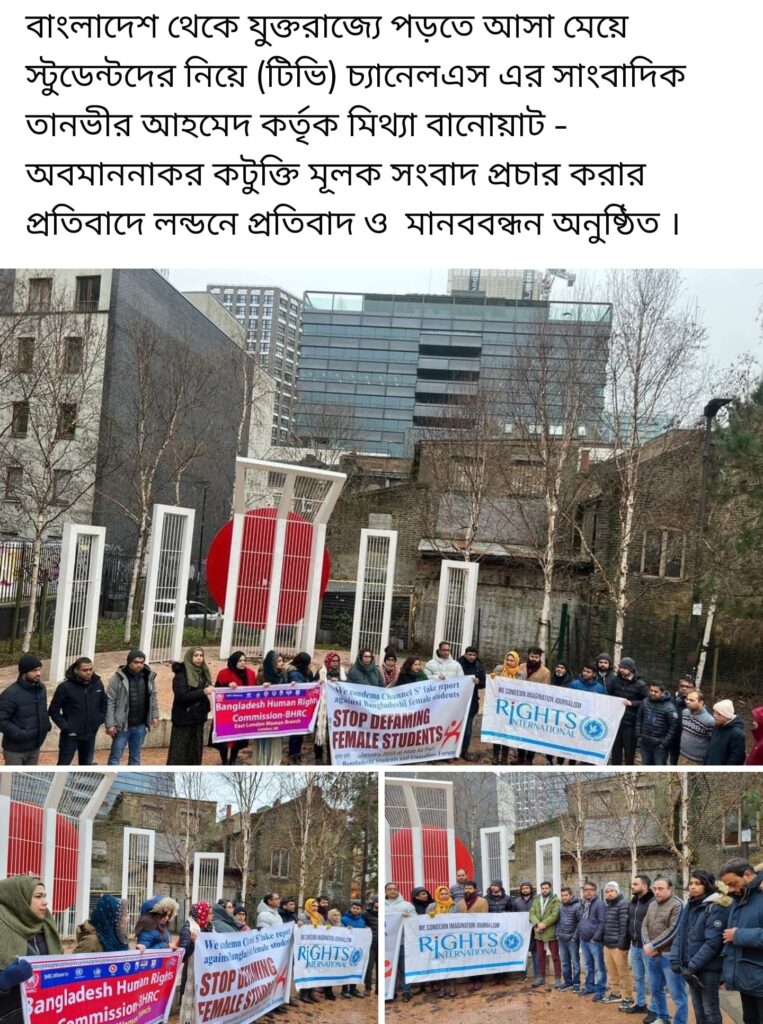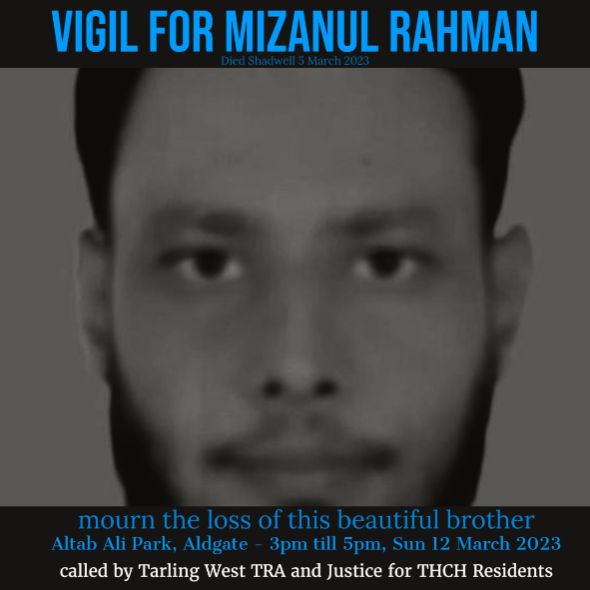The death of Mizanur Rahman and the subsequent investigation raises questions. From institutional failures to an apathetic politics dominated by Landlords and exploitative businesses. An avoidable death, but one that is just a tip of an iceberg of an infrastructure of exploitation of migrant workers in the modern East End.
A Death in Shadwell, Tower Hamlets
In the early hours of March 5th, 2023, a blaze erupted at Maddock House, nestled in the heart of Shadwell, Tower Hamlets. The modest three-bedroom abode, home to an estimated 18 individuals, was soon engulfed in flames, leaving little but smouldering ashes in its wake. Despite the valiant efforts of firefighters, Mizanur Rahman, a resident of the dwelling, was tragically discovered by authorities and later succumbed to his injuries.
As the community reels from the incident, the announcement of a criminal investigation provides little solace to those familiar with the struggles of Maddock House’s occupants. In the wake of this tragedy, probing inquiries have arisen, probing far beyond the confines of any legal probe. Some locals question the role of institutional failures that may have contributed to the devastating outcome, while others delve into more sinister lines of inquiry surrounding the well-known exploitation of migrants that is rife throughout Tower Hamlets.
Overcrowding and multiple occupation exploitation by Landlords have long been an issue in Tower Hamlets. In the Alice in Wonderland world of Tower Hamlets politics, it was the Conservatives who put forward proposals to tighten up rules on Landlords in particular House in Multiple Occupations (HMOs). Only for the proposals to be voted down by the Labour administration, many of whom declared before the votes were HMO Landlords.
It is clear that the blaze at Maddock House has opened up a veritable Pandora’s box of issues plaguing the modern East End. The tragic death of Rahman serves as a grim reminder of the unyielding realities faced by those at the mercy of unscrupulous landlords and inhospitable living conditions. As the flames die down and the dust begins to settle, one can only hope that this event will serve as a catalyst for much-needed change in the community.
Institutional failure by Tower Hamlets Council
The leasehold property in question, purchased through the Right to Buy scheme from Tower Hamlets Council, was rented out to a staggering 18 occupants in a cramped three-bedroom flat, yielding a monthly income of £8,000 for the owner. It is worth noting that the council, in line with its controversial Arms Length Management Organisation (ALMO), did not directly manage the property and surrounding estate. Rather, the organisation, notorious for its lack of accountability and susceptibility to political influence, oversaw the council’s responsibilities. Despite objections from myself and other councillors, the ALMO’s contract was ultimately renewed by the then-mayor, John Biggs, and his cabinet.
However, the tragic death of Mizanur Rahman at Maddock House has brought the inadequacies of this system into sharp focus. Complaints from the residents of Maddock House and the Tarling West estate regarding overcrowding were repeatedly lodged with the council and its subsidiary, Tower Hamlets Homes, to no avail. One resident lamented that “the landlord clearly breached his lease agreement, but no action was taken.” The recent renewal of the landlord’s license in August 2022, despite resident complaints, has further fuelled suspicions and calls for greater enforcement.
As the community grieves, serious questions linger over the identity and motives of the landlord. Could he be a “protected person” or even a “made man”? Only time will tell if this tragedy will serve as a wake-up call to address the longstanding and pervasive issues of exploitation and institutional failures in the East End.
Open Exploitation of Migrants in the East End – The ‘Dubaification’ of Tower Hamlets
The exploitation of migrant workers is not just a problem that exists in far-off places like Dubai. Rather, it is a disturbingly prevalent issue in Tower Hamlets, where workers are often packed into unsafe and unsanitary living conditions and subjected to various forms of exploitation, including the withholding of wages.
The root of this issue lies in recent changes to employment legislation, which were intended to address labour market shortfalls but have instead created a Middle Eastern-style Kafala System. Under this system, migrant workers are required to have an in-country sponsor, usually their employer, who is responsible for their visa and legal status. This arrangement has been widely criticized by human rights organisations for facilitating the exploitation of workers, as employers are regularly able to abuse their power with little fear of legal consequences.
One particularly egregious example of this abuse is the practice of withholding wages or forcing workers to pay back debt incurred for “visa processing fees.” This type of exploitation leaves workers with no choice but to take on additional precarious employment, such as delivery driving, which can be dangerous and exhausting. In fact, just recently, a delivery driver in Tower Hamlets collapsed from exhaustion.
These exploitative practices force migrant workers into a vicious cycle, where they are forced to accept substandard living conditions and employment in order to make ends meet, only to be subjected to even worse forms of exploitation. It is a distressing and unacceptable reality that must be addressed.
Do as I say, not as I do – The case study of the exploitation of female migrant workers
In a recent exposé by the Bangladeshi media, the exploitation of female migrant workers in Tower Hamlets was brought to light. However, instead of sparking a much-needed debate, the response was quite the opposite. Figures closely linked to the Tower Hamlets Labour Party, who also run businesses that import workers under the new ‘Kafala System’, organized a demonstration, portraying the exposé as an insult to the Bangladeshi community. This demonstration was backed by the local Labour leadership, exposing the perilous nexus between politics and business, and proving Samuel Johnson’s famous dictum that patriotism is indeed the last refuge of the scoundrel.

This incident not only highlights the scale of the problem of exploitation in the area, but also the challenges in having necessary conversations about race and class, especially in the face of a booming rentier exploitative economy in Tower Hamlets. Economic activities underpinned by, in effect, modern slavery. It underscores the deep-rooted nature of these exploitative systems and the urgent need for systemic change.
The Mirror and the Lamp – Our treatment of migrants sheds light on us and the society around us

The issue of migrant worker exploitation in Tower Hamlets is a revealing litmus test of our societal and political values. The recent controversy surrounding Gary Lineker’s unabashed Liberal stance on refugee rights is a testament to the lingering presence of Liberal values in our politics. However, the conspicuous silence surrounding the exploitation of migrant workers in our communities is a sobering reminder of the hypocritical tendencies of our public institutions and leaders.
Tower Hamlets has a rich legacy of migration, but it also has a sordid history of exploiting migrant workers. From the exploitation of migrants in the late 19th century to the Sari Squad movement against the deportation of Afia Begum, the fight against migrant worker exploitation has been an ongoing battle. We must honour these traditions and confront those who profit off the backs of vulnerable workers.
If we fail to address this issue now, the rot will only spread, and we may wake up one day to find ourselves in a Dubai-on-Thames scenario. A glittering facade of prosperity built upon the exploitation of migrant workers, with towering skyscrapers and sprawling malls obscuring the grim reality beneath.

The history of the East End teaches us that it doesn’t have to be this way, but it will require concerted effort and courage to confront the forces of exploitation head-on.
#AnotherEastEndIsPossible


Recent Comments